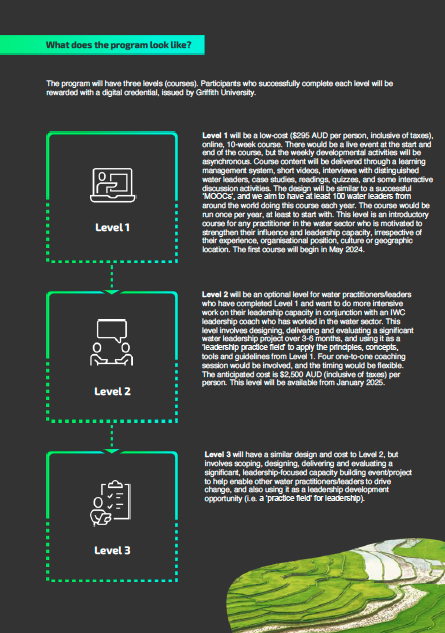
- Research project
- – Western Pacific
We’ve been running the Water Leadership Program (WLP) since 2011 as a way of developing leadership skills and knowledge in emerging leaders. Leadership skills and knowledge to be able to lead teams of people more effectively, to champion new practices and ideas, to create and lead new initiatives across institutional, disciplinary and constituency boundaries and to lead authentically and ethically.
We’ve taken what research demonstrates to be the most effective ways of developing leaders, and created a transformative program that equips graduates with a wide range of knowledge, tools, frameworks and skills to be able to better exercise influence, drive change and advance more integrated and sustainable forms of water management. In particular, the WLP has been designed and is delivered each year in accordance with the following principles established through leadership development research:
We’re now in our 13th year and have produced around 300 graduates from the WLP with a further 25 or so mid-program. This is terrific in the context of building water leadership capacity across Australia but it is a tiny drop in the ocean compared to leadership development needs globally.
The recent UN Water Conference in New York produced the Water Action Agenda – a call to action to co-ordinate and integrate commitments across all stakeholders and sectors in order to accelerate the implementation of Sustainable Development Goal 6 (SDG6). Achieving the Action Agenda is a call for commitment to action, a call to scale up and sustain activities and to monitor, evaluate and learn from outcomes.
It is in essence a call for significant, large scale change. Change that will require the rapid development of significant leadership capacity globally across the water sector. The need to build leadership capacity at scale echoes the call for 1000 water leaders for Africa and Asia first articulated in 2007 that has been reinforced in multiple successive Delft Symposia for Water Sector Capacity Development. We can’t and won’t achieve change without significantly increased leadership capacity.


The IWC is moving to play a part in realising the UN Water Action Agenda and the implementation of SDG6 through investing in the creation of a not for profit, low cost, accessible, high quality, at scale, global water sector leadership development program, the Pathway Program. The Pathway Program is being designed now to be ready to recruit later this year and to run for the first time next year. We are aiming for at least 100 and up to 1000 aspirant water leaders to join each running of Level 1 of the Pathway from any part of the world, and any part of the water sector – water utilities, community WASH, river basin management, water resources management, environmental management, from policy to planning, and from NGOs, governments, private sector and donor banks.
Level 1 is where we think we’ll achieve the most impact because of scale. We are designing it to utilise the best of the research underpinned material that we have created for the WLP, delivered in a way that focusses on providing high quality resources and practical, work based activities and learning (bearing in mind the 70:20:10 rule). We’ve been interviewing water sector practitioners and professionals from different countries and organisations and have developed a sufficiently detailed picture of the leadership challenges faced by different kinds of emerging water leaders globally who we will specifically target to benefit through the Pathway Program.
Level 2 will be individually coached and will likely only be of interest to a limited proportion of those who participate in Level 1 of the Pathway, but will enable those participants to develop their skills in the context of a challenging, work based leadership project. Finally, Level 3 will be for those Level 2 graduates who are looking to grow leadership capacity in their country, or place of work by learning how to operate as a water leadership coach.